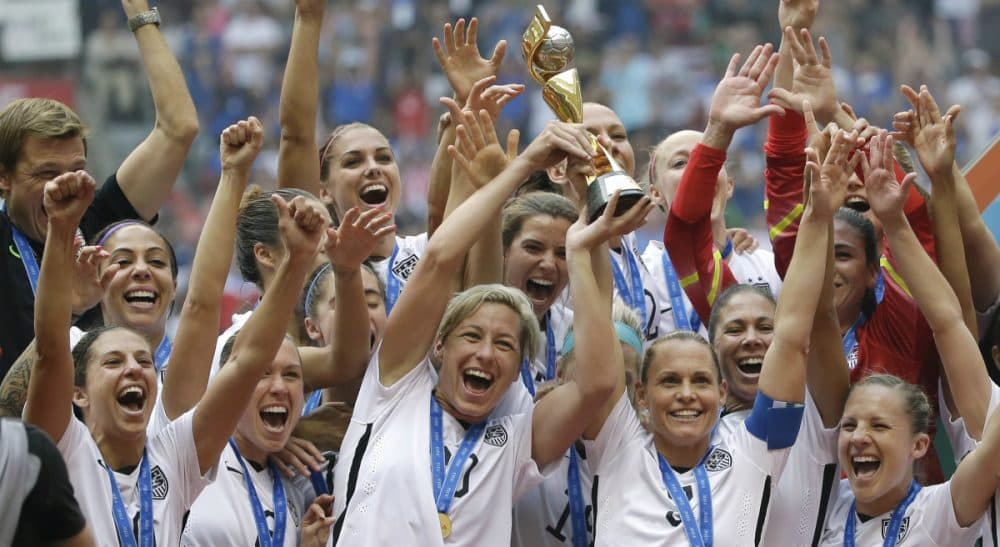Advertisement
Show Them The Money: End The Gross Disparity In World Cup Winnings

On Sunday night, as I cheered the U.S. women against Japan in the World Cup title game, I marveled at the women’s strength and stamina, stood with my mouth agape at the audacity of Carli Lloyd even attempting a 50-yard goal, and saluted her historic hat trick in the first 16 minutes of play. I never once thought, wow, I’m watching women; I was watching some of the greatest athletes on the planet.
I was not alone. An estimated 1.27 million viewers watched the game on Telemundo, and 25.4 million more watched on FOX, making the soccer game both the most-watched in U.S. history and, for FOX, the most lucrative, bringing in $40 million in ad revenues.
But for me, at the end of the game, the 5-2 final score was the only number that mattered.
Until I heard this: The winners of the Women’s World Cup earned a total of $2 million. By comparison, Germany, the winners of the 2014 Men’s World Cup (never singled out in its title by gender, but I think it should be), earned a total of $35 million. At first, I thought there was a typo. Surely they had left off a zero from the women’s tally. Then I heard that the first round losers in the Men's World Cup in 2014 collected $8 million just for being eliminated. So, the women take the whole thing and win a quarter of what the men win...for losing?
Do the American women train less than the men? Sacrifice less? Practice less? No. Do they win more? Heck, yes.
Talk about a FIFA scandal!
I’m not someone who gets hung up on statistics (with all due respect to those who reside in the fanatical world of analytics), but these numbers are disgraceful.
It’s bad enough that the women were forced to play on the more dangerous artificial turf (grass only for the men’s tourney), despite their immense protestations and lawsuit. But, according to ESPN, the overall prize money for male soccer players in the World Cup tournament is 24 times what FIFA allocates for the women’s bracket.
Do the American women train less than the men? Sacrifice less? Practice less? No. Do they win more? Heck, yes.
I imagine the footballers, to a woman, would say they want that World Cup trophy more than a sizable paycheck, to which I would respond: Why can’t they have both? I understand that sports are big business, and there are markets and rights fees and sponsorships. But I also see that more viewers than ever watched the women win the United States’ third World Cup, more titles than any other country. More people saw the women earn the third star than watched the decisive Game 6 of this year’s NBA Finals or Game 7 of the 2014 World Series. Isn’t this a huge building block for the future?
So what does the future hold? The World Cup, like the Olympics, has a short marketing attention span. So while Carli Lloyd, the best player in the tournament, may also be the most marketable, once NFL training camps open in a few weeks, she might be Carly Simon, the legendary singer.
I try to live in a world of no problems, only solutions. So show me the money. Rights fees for the Men’s and Women’s World Cup tournament aren’t broken down by gender, they are reported as one number. And that number keeps getting bigger. In February of this year, FOX and Telemundo won the American media rights to broadcast a host of FIFA events, including both Men’s and Women’s World Cups through 2026. And while those figures haven’t been made public, in 2011, when both networks earned the rights to broadcast the 2018 and 2022 World Cup tournaments, Sports Business Journal reported the total rights fee to be between $400 million to $500 million -- while NBCUniversal’s Telemundo paid $600 million for the U.S. Spanish TV rights. So think more years, even higher rates.
These figures are dizzying, but the bottom line remains: When does FIFA permit these monies to trickle down to the female athletes sacrificing their bodies and minds — can you say headers? — for the glory of the sport? If media rights fees are the driver, along with corporate sponsorships, when do the team shares begin to reflect this?
When does FIFA permit these monies to trickle down to the female athletes sacrificing their bodies and minds -- can you say <em>headers?</em> -- for the glory of the sport?
Achieving economic equity is a fierce battle to fight. Just ask female tennis players who only recently won equal pay at the four Grand Slam tournaments. Thanks to the efforts of Venus Williams, in 2007, Wimbledon started forking over $1.4 million to its male and female champions. It’s ironic, then, that there is pay equality in the sport of tennis, where different sets of rules apply: Women must win best of three matches, while men must prevail in a five-set format. Men’s and women’s games in soccer are identical.
I look at this fight to narrow the pay disparity gap in economic terms, but I defer to a woman who will forget more about soccer than I could ever hope to know. Julie Foudy won two World Cups and three Olympic gold medals as a 17-year member (13 of those as captain) of the U.S. team. The solution she proposes is for FIFA to invest in, promote and grow the women’s game around the world, starting at the youth level. Remember, soccer is a minuscule market in the United States relative to the rest of the world, yet female athletes are not as accepted or cultivated in many countries as they are in this one.
Reform in FIFA is fast approaching, with the imminent departure of President Sepp Blatter (and please, let’s not add time to his tenure as refs do to the end of games). Here’s hoping that the game cleans up its business practices and stops treating women as second class soccer citizens, especially as the Americans sit atop the world. I want to root for them as superior athletes and businesswomen.

